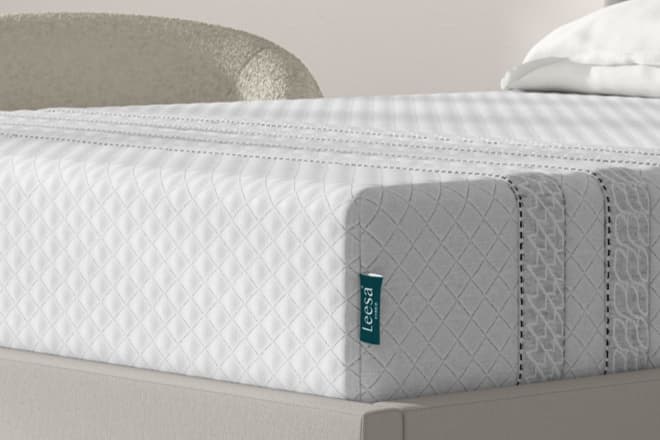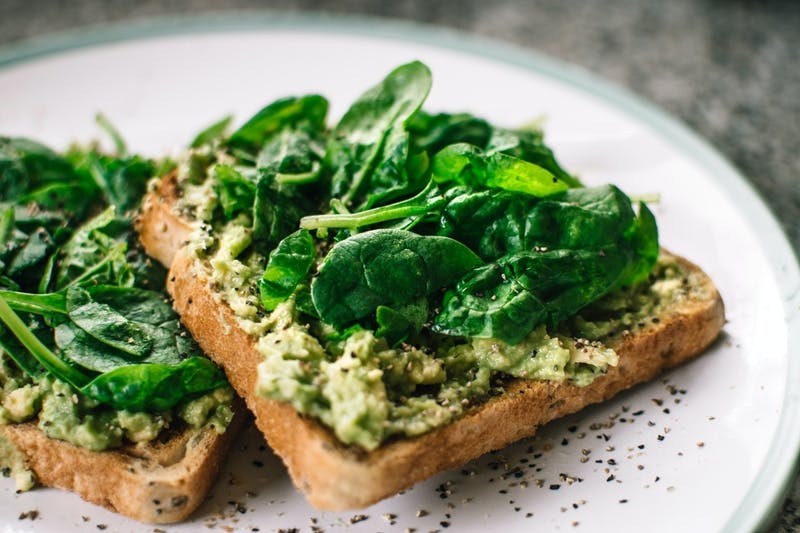There’s nothing like enjoying a big, homemade meal, having a late-night chip chow down, or digging into a warm cookie before bed after a long day. But is eating after bed bad for you? Can it affect weight loss or cause weight gain? What about its impact on your sleep? Experts weigh in on these issues with advice that often conflicts.
The answers to those questions vary across the board, from nutritionists to personal trainers to sleep experts, and many of these experts disagree on whether you should eat food before bed.
Those on the pro side claim a big meal can help you fall asleep--and stay asleep. Many on the cons side of the fence say eating close to bedtime can result in weight gain, heart disease, or high blood sugar.
At Leesa, sleep is kind of our thing. To help you figure out the pros and cons of snacking before bed, we're sharing some helpful tricks and best practices for your nighttime meals.
Pros of Eating Before Bed
Some experts argue that a bedtime snack has more pros than cons and can be beneficial to your health.
Weight Loss vs. Gain
Instead of causing weight gain, many experts say that eating before bed can promote weight loss. It might sound crazy, but your body needs energy when you sleep—after all, sleep is how your body recharges so that you wake up rested and ready to conquer the day. In fact, many studies show that your metabolic rate is almost the same while you’re sleeping as it is when you’re awake, so your body needs sustenance while you’re snoozing.
A major factor when it comes to weight gain has to do with what kind of meal or snack you have. As we mentioned, a high-protein snack, along with some carbs, will give your body the fuel it needs to function properly while you sleep and help promote weight loss, not gain. If you need to snack at night (or want to sip on something before bed), try to choose something healthy.
A great nighttime snack is cottage cheese or turkey (both high-protein) protein) and loaded with the amino acid tryptophan. Tryptophan is well known to make you sleepy–think about it after Thanksgiving dinner. You can also try decaffeinated or herbal tea, some of which are even made specifically for bedtime. Tart cherries or pistachios are both great sources of melatonin, a hormone in your body that makes you sleepy.
Fall Asleep Faster and Sleep Better
We all have our go-to comfort foods—mac’n’cheese, warm soup, grilled
cheese—we’re getting hungry just thinking about it. After you indulge in
your favorite meal, nothing’s better than curling up on the sofa under a
blanket as the ultimate couch potato. The coma-like state related to
eating your favorite comfort foods also applies to having a big dinner
or bedtime snack before bed.

Some experts correlate eating at night with better sleep. They argue that if you nosh on something before you go to sleep, your stomach feels full and you may fall asleep faster and sleep longer. Plus, you won’t wake up hungry in the middle of the night.
Wait—so, are we saying you can stuff yourself full of your favorite foods and it’s good for you? Not quite. We’re not encouraging you to eat a whole gallon of ice cream or a third (or fourth) serving of chicken and dumplings every night before bed. Your nighttime meal or snack should have some nutritional value. Try an apple with peanut or almond butter or a piece of avocado toast as a tasty, healthy late-night snack.
Curb Cravings
For people who are comforted by food, specifically by a bedtime snack, having a small, healthy snack about an hour and a half after dinner can help curb unplanned eating later in the night. Plus, if you eat a little more at night, you won’t wake up feeling famished in the morning with your stomach growling. You’ll eat less during the day, decreasing your daily caloric intake.
This is especially true of carbs. While you’re asleep, your body won’t burn off carbs like it does when you’re active and awake. Foods like pasta and pizza, yummy as they are, are probably not the best choices for nighttime eating.Cons of Eating Before Bed
Conventional wisdom has it that it's bad to eat before bed. We hear it from fitness trainers, read it in magazines, even some licensed nutritionists say so. But why?
Your Body Slows Down at Night
Many claim you have a slower metabolism when you’re sleeping, which means the calories are burned off more slowly, too. (Side note: many experts argue that your metabolism is just as active while you sleep–we’re not here to give medical advice–just some suggestions).
Indigestion and Heartburn
If used to eating a big meal before bed, you may experience indigestion or heartburn. Even if you don’t deal with indigestion during the day normally, if you eat a lot (especially spicy foods) and then immediately get in bed, laying down could cause acid reflux--you know, that annoying heartburn that gives you trouble swallowing, and sometimes, even nighttime asthma.
Experts recommend adjusting your eating habits by spacing your meals and eating before bedtime, so your body has time to digest your food before you crawl under the covers. And if your doctor has diagnosed you with gastroesophageal reflux disease, reconsider that bedtime snack.
Meal Sizes at Dinner
The evening is the time of day when many people are the hungriest, so they get in the habit of eating a large meal in the evening. This can start the cycle of eating too much at night (and overeating in general). Think about it—if you’re stuffed when you go to bed, you won’t be as hungry for breakfast, so you’ll eat less breakfast and have a smaller lunch.
By dinner time, you’re really hungry and you’ll end up eating more calories than you should (you may even want another small meal or snack after dinner, too). If you can train your body to consume the most calories earlier in the day, it'll have more time to digest and metabolize them. Plus, you’ll be less hungry at dinner time.
Making Unhealthy Choices
Another con to nighttime meals or snacks is food choice. Many people reach for certain foods as a late-night snack, like a slice of pizza or cookies, instead of healthy alternatives. Not to mention that a popular nighttime snacking activity is sitting in front of the TV. If you’re reaching into a bag of chips repeatedly while binge-watching your favorite show, you’re more likely to overeat. (Guilty!) This can tip your daily calorie consumption, too, not to mention have a negative impact on your health.
Tips for Nighttime Snacking
Make Healthy Choices
If you’re going to have a bedtime snack or late dinner before bed, try and steer clear of sweets and junk food. High-calorie foods, especially those that are high in sugar and unhealthy fats, aren’t great before bed. For example, when you swear you’re just going to have one Oreo but end up eating a whole row. Hey, sometimes it happens, but it’s not a good habit to get into.
Some good nighttime snacks include complex carbs like whole grains, fruits or veggies, or a protein or small portion of fat. This snack will give you a little energy going into bedtime, keep you full all night and keep your blood sugar stable while you sleep. Don’t go to bed hungry.
How Long Before Bed Should you Stop Eating?
So, what’s the rule here? Should you wait 30 minutes before going to bed after eating just like your mom always made you wait at the pool after lunch? Nope, you should allow more time. Experts recommend waiting at least three hours after you’ve eaten to go to bed. This allows your body time to digest your food so you’re not up at night with an upset stomach, indigestion, or acid reflux. And it helps you stay asleep.
Don’t forego a meal to follow this rule. Life happens. If you don’t get home until 8:30 p.m. and want to be in bed by 10 p.m., you shouldn’t skip dinner just because you won’t have three hours between eating and bedtime. The three-hour rule isn’t a “must”-- it’s simply a guideline to follow when you can (much like that 30-minute rule at the pool).
Try Intermittent Fasting
Many dietitians and nutritionists suggest a fasting period at night helps you lose weight, improve your metabolism, boost your health, and stabilize your blood sugar. Some popular options are 12- or 15-hour fasting schedules. For example, if you’re on a 12-hour schedule, you would only eat for 12 hours of the day.
So, you eat from the first thing you eat for breakfast to the last thing you eat, whether that’s dinner, dessert, or a snack, let’s say from 8 a.m. to 8 p.m. Then, from 8 p.m. to the next morning at 8 a.m., you fast. Not only can fasting help with weight loss, but it can also help you improve your sleep.
If you don’t eat past 8 p.m., you aren’t stuffed from a huge meal right before you crawl into bed. Your body has already started to break down your last meal, so you won’t have acid reflux when you lie down.
You may still be a little confused whether or not eating before bed is good or bad and that’s probably because there isn’t a definitive answer. You have to find the meal schedule that’s right for your lifestyle, health, and body—everyone’s different. What works for your partner might not work for you. Whether you thrive on late-night snacks or prefer to stick to the three-hour rule, try and make healthy choices and listen to your body so that you stay healthy and get your best, most restful sleep.
How Can Leesa Help You Have a Better Sleep?
Whether you choose our original memory foam Leesa, our new affordable Studio mattress, the Leesa Sapira Hybrid, or our Legend Hybrid mattress, we promise you the best sleep of your life. Our breathable memory foam doesn't make you hot as other foam mattresses can, and it's supportive of your hips and shoulders--perfect for side sleepers. Try one of our premium pillows, too. Our mattresses carry a limited lifetime warranty and are designed and assembled in the USA.
Try our 100-night risk-free trial and see if Leesa is for you. You'll love it. Your health will, too.
FAQs
What should I eat before bed?
Choose a complex carb (whole-grain toast or cereal) and something with protein or healthy fats. Avocado toast is a great example. So is cheese and crackers. Or have something high protein, like string cheese or a bit of nut butter. Keep it healthy--and don't eat in bed!
How many hours before bed should I eat?
It's recommended that your last food of the day be consumed three hours before bedtime to give your stomach the time to begin digestion. This isn't a hard and fast rule, though. Be flexible and see what works best for you.
How long should I sit up after eating?
Laying down could cause acid reflux. Experts recommend adjusting your eating habits by having dinner at least three hours before crawling under the covers. If your doctor has diagnosed you with gastroesophageal reflux disease, reconsider that bedtime snack.
Is it bad to sleep after eating?
Laying down could cause acid reflux. Experts recommend adjusting your eating habits by having dinner at least three hours before crawling under the covers. If you must have a snack before bed, choose whole grains and fruits and vegetables instead of sugary or salty treats.



